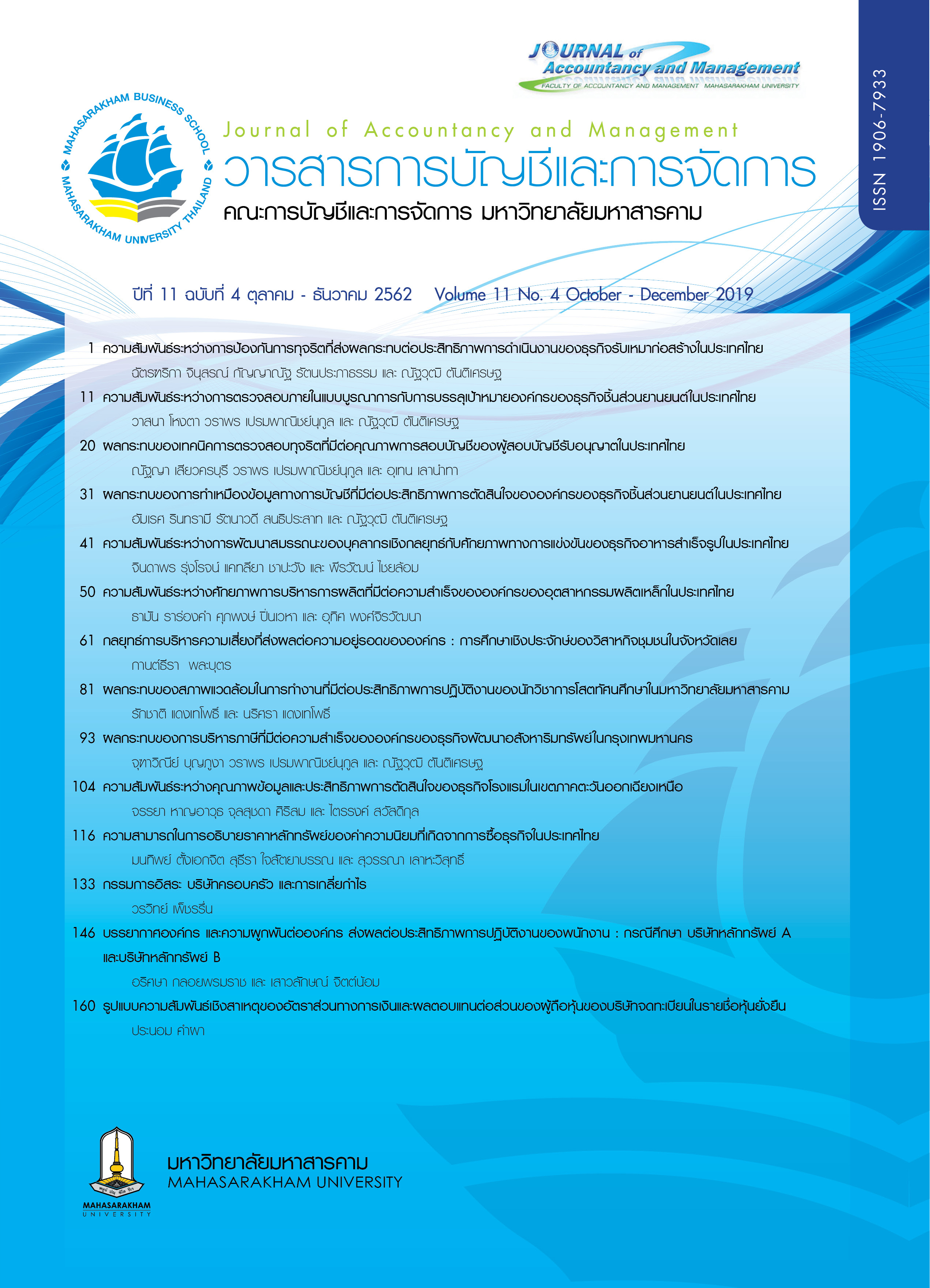ความสามารถในการอธิบายราคาหลักทรัพย์ของค่าความนิยม ที่เกิดจากการซื้อธุรกิจในประเทศไทย
Main Article Content
บทคัดย่อ
การศึกษานี้มีวัตถุประสงค์เพื่อศึกษาความสามารถในการอธิบายราคาหลักทรัพย์ของค่าความนิยมที่เกิดจากการซื้อธุรกิจของบริษัทที่จดทะเบียนในตลาดหลักทรัพย์แห่งประเทศไทย โดยเก็บข้อมูลจากฐานข้อมูล SETSMART และที่เผยแพร่บนเว็บไซต์ของสำนักงานคณะกรรมการกำกับหลักทรัพย์และตลาดหลักทรัพย์ระหว่างปีพ.ศ. 2555 ถึง ปี พ.ศ. 2559 ข้อมูลที่รวบรวมได้จำแนกเป็นข้อมูลรายปี จำนวน 118 ข้อมูล และข้อมูลรายไตรมาส จำนวน 136 ข้อมูล ผลการวิเคราะห์การถดถอยพหุคูณของข้อมูลรายปีและรายไตรมาสต่างพบว่า มูลค่าตามบัญชีที่ไม่รวมค่าความนิยม ค่าความนิยม และกำไรสุทธิมีความสัมพันธ์ในทิศทางเดียวกันกับราคาหลักทรัพย์อย่างมีนัยสำคัญทางสถิติ แสดงว่า ข้อมูลค่าความนิยมที่เกิดจากการซื้อธุรกิจที่ปรากฏในงบการเงินประจำปีและงบการเงินรายไตรมาสเป็นข้อมูลที่มีคุณค่าเกี่ยวกับการตัดสินใจ ผลการศึกษานี้ย่อมเป็นประเป็นประโยชน์ต่อนักลงทุน นักบัญชี และหน่วยงานกำกับดูแลได้ตระหนักถึงคุณค่าของข้อมูลค่าความนิยมที่ได้รับจากการซื้อกิจการมากยิ่งขึ้น
Downloads
Article Details
บทความที่ได้รับการตีพิมพ์เป็นลิขสิทธิ์ของวารสารการบัญชีและการจัดการ
ข้อความที่ปรากฏในบทความแต่ละเรื่องในวารสารวิชาการเล่มนี้เป็นความคิดเห็นส่วนตัวของผู้เขียนแต่ละท่านไม่เกี่ยวข้องกับมหาวิทยาลัยมหาสารคาม และคณาจารย์ท่านอื่นๆในมหาวิทยาลัยฯ แต่อย่างใด ความรับผิดชอบองค์ประกอบทั้งหมดของบทความแต่ละเรื่องเป็นของผู้เขียนแต่ละท่าน หากมีความผิดพลาดใดๆ ผู้เขียนแต่ละท่านจะรับผิดชอบบทความของตนเองแต่ผู้เดียว
เอกสารอ้างอิง
กัลยา วานิชย์บัญชา. (2556) . การวิเคราะห์สถิติ: สถิติสำหรับการบริหารและวิจัย. กรุงเทพฯ: โรงพิมพ์แห่งจุฬาลงกรณ์มหาวิทยาลัย.
ตลาดหลักทรัพย์แห่งประเทศไทย. (2562ก). การควบรวมกิจการ. ค้นเมื่อ พฤษภาคม 2562, จาก https://www.set.or.th/th/market/MnA_p2.html
ตลาดหลักทรัพย์แห่งประเทศไทย. (2562ข). ทางเลือกสู่ความสำเร็จของไทย. ค้นเมื่อ พฤษภาคม 2562, จาก https://www.set.or.th/th/market/files/mna/Final_MnA.pdf
วรลักษณ์ โรจนรัตน์. (2550). ความสัมพันธ์ระหว่างสินทรัพย์ไม่มีตัวตนกับราคาหลักทรัพย์และกำไรในอนาคตของบริษัทจดทะเบียนในตลาดหลักทรัพย์แห่งประเทศไทย. วิทยานิพนธ์บัญชีมหาบัณฑิต. กรุงเทพฯ: จุฬาลงกรณ์มหาวิทยาลัย.
สภาวิชาชีพบัญชี ในพระบรมราชูปถัมภ์. (2558). มาตรฐานการรายงานทางเงิน ฉบับที่ 3 (ปรับปรุง 2558)
เรื่อง การรวมธุรกิจ. ค้นเมื่อ 10 พฤศจิกายน 2560. จาก https://www.fap.or.th/TFRS.pdf
สภาวิชาชีพบัญชี ในพระบรมราชูปถัมภ์.(2558). มาตรฐานการการบัญชี ฉบับที่ 38 (ปรับปรุง 2558) เรื่อง สินทรัพย์ไม่มีตัวตน. ค้นเมื่อ 10 พฤศจิกายน 2560. จาก https://www.fap.or.th
สำนักงานคณะกรรมการกำกับหลักทรัพย์และตลาดหลักทรัพย์แห่งประเทศไทย. (2558). งบการเงินและรายงานตามมาตรา 56 ของบริษัทที่ออกหลักทรัพย์. ค้นเมื่อ เมษายน 2560 จาก https://www.sec.or.th
ศรัณยู เทศศรีเมือง และกนกอร แก้วประภา. (2561). ความสัมพันธ์ระหว่างสินทรัพย์ไม่มีตัวตนและผลตอบแทนที่ผิดปกติของบริษัทในตลาดหลักทรัพย์แห่งประเทศไทย. วารสารการบัญชีและการจัดการ. 10(2): 178-188
ศูนย์วิจัยกสิกรไทย. (2562). เปิดโผธุรกิจรุ่ง ปี 62. ค้นเมื่อ 8 พฤษภาคม 2562, จาก https://www.kasikornbank.com/th/business/sme/KSMEKnowledge/article/KSMEAnalysis/Documents/Business-Trend-2019.pdf
อรอนงค์ เกียรติพจนจินดา. 2557. ความสัมพันธ์ระหว่างผลขาดทุนจากการด้อยค่าของค่าความนิยมกับราคาหลักทรัพย์: กรณีศึกษาบริษัทจดทะเบียนในตลาดหลักทรัพย์แห่งประเทศไทย. การค้นคว้าแบบอิสระบัญชีมหาบัณฑิต. กรุงเทพฯ: มหาวิทยาลัยธรรมศาสตร์.
Ali, A., & Hwang, L.S. (2000). Country-specific factors related to financial reporting and the value relevance of accounting data. Journal of Accounting Research. 38(1), 1-21.
Beaver, W.H., 2002. Perspective on recent capital market research. The Accounting Review. 77(2), 453-474.
Black, K. (2006). Business statistics: For contemporary decision making (4th ed.). USA: John Wiley & Sons.
Collins, W.D., Maydew, L.E., and Weiss, S.I. (1997). Changes in the value-relevance of earnings and book values over the past forty years. Journal of Accounting and Economics. 24(1). 39-67.
Francis, J., & Schipper, K. (1999). Have financial statements lost their relevance? Journal of Accounting Research. 37(2), 319-352.
Graham,R., King, R., & Balies, J. (2000). The value relevance of accounting information during a financial crisis: Thailand and the 1997 decline in the value of the Baht. Journal of International Financial Management and Accounting. 11(2): 84-107.
Gujarati. (2004). Basic econometrics (4th ed.). Boston: The McGraw-Hill Companies.
Ibrahim, M. K. (1999). Market value, book value and goodwill. Unpublished Doctoral Dissertation, University of Wales, Bangor.
Jennings, R., Robinson, J. Thompson II. R. B. & Duvall, L. (1996). The relation between accounting goodwill numbers and equity values. Journal of Business Finance & Accounting. 23 (4), 513-533.
McCarthy, M.G. & Schneider, D.K. (1995). Market perception of goodwill: Some empirical evidence. Accounting and Business Research. 26(1), 69-81
Ohlson, J. A. (1995). Earnings, book values and dividends in equity valuation. Contemporary Accounting Research. 11(2), 661–687.
Oliveira, L., Rodrigues, L. & Craig, R. (2010). Intangible assets and value relevance: Evidence from the Portuguese stock exchange. The British Accounting Review. 42(4), 241-252.
Stober, T.L.(1999). Empirical applications of the Ohlson (1995) and Feltham abd Ohlson (1995,1996) valuation models. Managerial Finance. 25(1), 3-16.
Suadiye, G. (2012). Value relevance of book value and earnings under the local GAAP and IFRS: Evidence from Turkey: Ege Akademik Review. 12(3), 301-310.
Yamaji, N. & Miki, J. (2009). The value relevance of goodwill amortization: Evidence from listed Japanese companies. BA Business and Accounting Review. 7,19-30.


